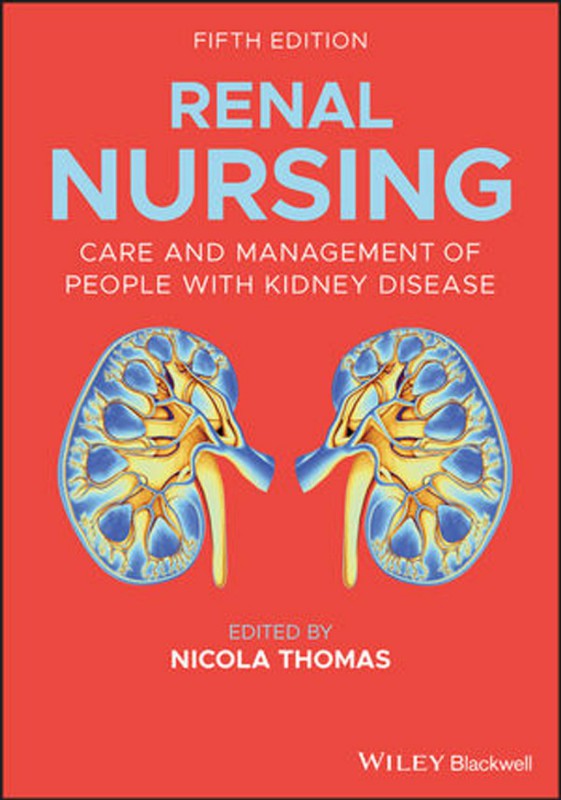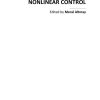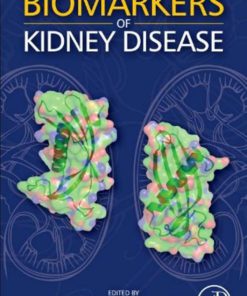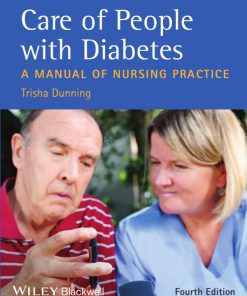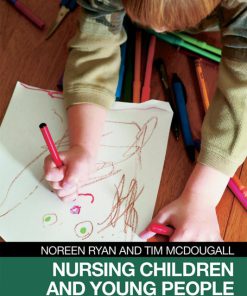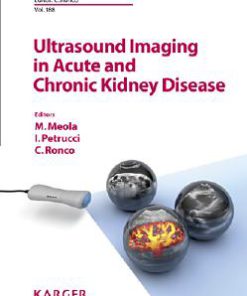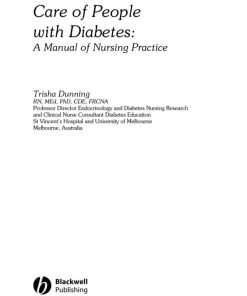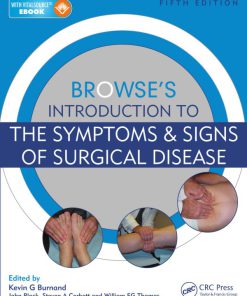Renal Nursing Care and Management of People with Kidney Disease 5th edition by Nicola Thomas ISBN 1119413141 978-1119413141
$50.00 Original price was: $50.00.$25.00Current price is: $25.00.
Authors:Renal nursing care; management of people; kidney disease-Wiley Blackwell John Wiley; Sons (2019) , Series:Nursing [168] , Author sort:care, Renal nursing & people, management of & Wiley, kidney disease-Wiley Blackwell John & Sons (2019) , Languages:Languages:eng , Published:Published:Jul 2019 , Publisher:Wiley Blackwell
Renal Nursing: Care and Management of People with Kidney Disease 5th edition by Nicola Thomas- Ebook PDF Instant Download/Delivery. 1119413141 978-1119413141
Full download Renal Nursing: Care and Management of People with Kidney Disease 5th edition after payment

Product details:
ISBN 10: 1119413141
ISBN 13: 978-1119413141
Author: Nicola Thomas
Now in its fifth edition, Renal Nursing continues to be the essential evidence-based guide to nephrology and kidney care for nurses and allied health care professionals. This comprehensive text examines the stages of chronic kidney disease, pre-dialysis care, acute kidney injury, renal replacement therapy, renal nutrition, renal care in children and young people and more.
- Offers thorough coverage of all major aspects of kidney care
- Includes updated content on current practice, changes in policies, care and management, with the latest research evidence and current NICE guidance on renal replacement therapy
- Has an innovative chapter on patient and public involvement in kidney care
Renal Nursing is an indispensable resource for nurses working in nephrology, dialysis and transplantation, nurses in post-registration renal courses, student nurses in renal wards, specialist renal dietitians, pharmacists and other allied health professionals in related fields.
Renal Nursing: Care and Management of People with Kidney Disease 5th Table of contents:
CHAPTER 1: The History of Dialysis and Transplantation
Introduction
Haemodialysis
Peritoneal Dialysis
Transplantation
Conclusion
References
CHAPTER 2: Applied Anatomy and Physiology and the Renal Disease Process
Introduction
Structure and Functions of the Kidney
Basic Renal Processes
Conditions Causing Chronic and Advanced Kidney Disease
References
Resources
CHAPTER 3: Patient and Carer Involvement in Renal Nursing Care, Education, and Research
Introduction
Patient Involvement in Care
Patient‐Reported Experience Measures
Reflection
Patient Involvement Using Social Media: The Renal Patient Support Group, Facebook, Twitter, BlogSpot, and Instagram
The Renal Patient Support Group on Facebook
Patient and Carer Involvement in Renal Nursing Education
Patient and Carer Involvement in Renal Research
Kidney Patient Involvement Network
INVOLVE
Measuring the Impact of Patient and Public Involvement
Conclusion
References
Resources
CHAPTER 4: Psychological Perspectives
Introduction
Psychonephrology
Chronic Kidney Disease
Patient Choice
Depression
Sexuality
Patient Education
Self‐Care
Conservative Kidney Management (Nondialytic Options)
Transplantation
Conclusion
References
CHAPTER 5: Acute Kidney Injury
Introduction
Identifying The Cause(s) of Acute Kidney Injury
Management of Acute Kidney Injury
The Clinical Course of Acute Kidney Injury
Renal Replacement Therapy (RRT) in Acute Kidney Injury
Conclusion
References
Further Reading
Useful Web Sites
CHAPTER 6: Chronic Kidney Disease
Introduction
Chronic Kidney Disease
Innovation in Managing Mild to Moderate Kidney Disease in Primary Care
Care and Management of Mild to Moderate Kidney Disease (Stages 3a–3b)
Diabetes Mellitus
Care and Management of Moderate to Severely Decreased Kidney Function (Stage 4)
Education in the Predialysis Phase
When Should Dialysis Commence?
Conclusion
References
Resources
CHAPTER 7: Investigations in Kidney Disease
Introduction
Phlebotomy
Biochemical Blood Tests
Kidney Function Tests
Kidney Biopsy
Radiographic Investigations
Conclusion
References
CHAPTER 8: Haemodialysis
Introduction
What Is Haemodialysis?
How Does Haemodialysis Work?
Mortality and Haemodialysis
Haemodialysis Prescription
Anticoagulation
Vascular Access for Haemodialysis
Assessment and Monitoring During Haemodialysis
Less Common Complications of Haemodialysis
Patient’s Perspective of Haemodialysis
Conclusion
References
CHAPTER 9: Peritoneal Dialysis
Introduction
Physiology of Peritoneal Dialysis
Peritoneal Dialysis Access and Exit Site Care
Peritoneal Dialysis Therapy Options
Patient Selection
Peritoneal Dialysis for Those with Diabetes
Solution Formulation
Assessing Peritoneal Dialysis Adequacy
Longitudinal Changes to the Peritoneal Membrane
Fluid Management in Peritoneal Dialysis
Problem Solving in Peritoneal Dialysis
Infectious Complications of Peritoneal Dialysis
Education and Training for Those on Peritoneal Dialysis
Conclusion
References
Additional Resources
CHAPTER 10: Renal Transplantation
Introduction
Contraindications to Renal Transplantation
Evaluation for Transplantation
Pretransplantation Preparation
Specific Pretransplant Anxieties and Fears
Transplant Waiting List
Donor and Recipient Matching
Deceased Donation
Living Relation Donation
Increasing Donor Organ Supply
Preoperative Management for a Recipient of a Renal Transplant
Surgical Technique for Renal Transplantation
10.13 Immunosuppression
Renal Transplant Rejection
Postoperative Care and Complications for the Recipient of a Renal Transplant
Discharge of the Recipient from Hospital and Continuing Care
Pancreas‐Kidney Transplantation
Conclusion
References
CHAPTER 11: Nondialytic Options and the Role of Palliative Care
Introduction
Numbers of Patients
The Importance of Nondialytic (Conservative) Care
The Palliative Approach
Recent Government and Other Initiatives
Communication, Decision‐Making, and Planning
Care of Patients Managed Without Dialysis
Symptoms Towards the End of Life
Psychological and Social Issues
Spiritual Care
Conclusion
References
CHAPTER 12: Renal Care in Infancy, Childhood, and Early Adulthood
Introduction
Physiology in Childhood – Impact on Renal Care
Chronic Kidney Disease
Conservative management
Nephrotic Syndrome
Renal Replacement Therapy
Dialysis
Acute Kidney Injury
Haemolytic Uraemic Syndrome
Transition to Adult Services
Conclusion
References
CHAPTER 13: Renal Nutrition
Introduction
Historical Review of Dietary Management
Current Concepts of Predialysis Dietary Intervention
Hypertension
Cardiovascular Risk and Hyperlipidaemia
Interventions in Patients with Diabetes
Calcium, Phosphate, and Vitamin D Metabolism
Hyperkalaemia
Anaemia
Acidosis
Malnutrition
Nephrotic Syndrome
Dietary Management: Dialysis
Malnutrition
Techniques to Assess Body Composition
Transplantation
Dietary Management in Paediatrics
Conclusion
References
13.A: Calculation of Body Mass Index and Ideal Body Weight
13.B: Seven‐Point Subjective Global Assessment
13.C: Foods with a High and Low Sodium (Salt) Content
13.D: Foods with High and Low Phosphorus Content
13.E: Foods with High, Medium, and Lower Potassium Content
CHAPTER 14: Quality Improvement in Kidney Care
Introduction
Quality Improvement
Patient Safety
Best Practice Guidelines from International and National Renal Associations
Other Guidelines
Evaluation of Guidelines
Audit
Quality and Service Improvement Methods
Conclusion
References
People also search for Renal Nursing: Care and Management of People with Kidney Disease 5th:
how to care for a patient with renal failure
what is a renal nurse
what does a renal nurse do
nursing management of acute kidney failure
renal nursing care plans
You may also like…
eBook PDF
Biomarkers in Kidney Disease 1st Edition by Charles Edelstein ISBN 0123756723 9780123756725

